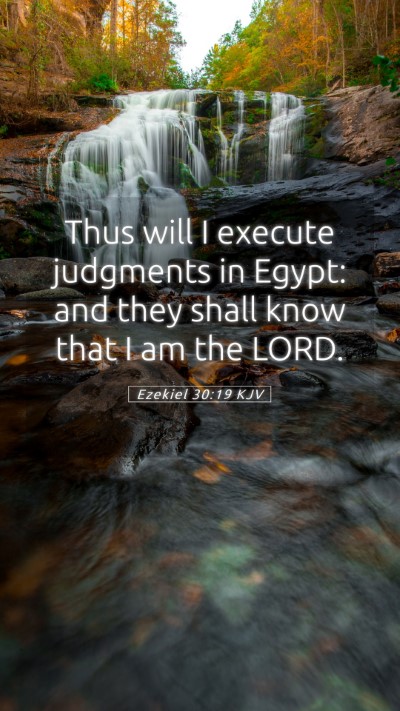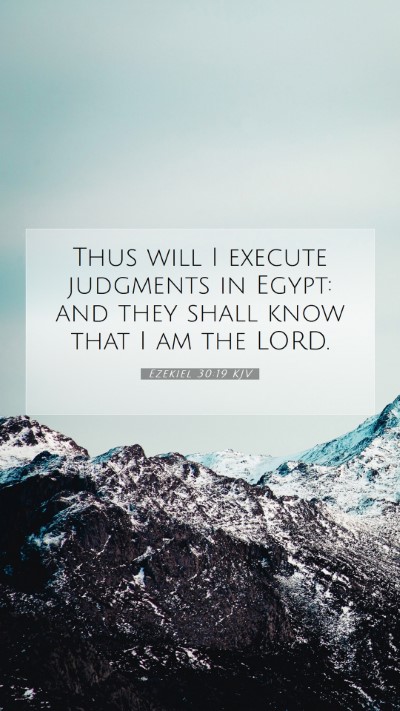Ezekiel 30:19 - Summary and Interpretation
The verse Ezekiel 30:19 states:
"Thus will I execute judgments in Egypt: and they shall know that I am the LORD." This verse is part of a larger prophecy concerning Egypt and serves as a reminder of God's sovereignty and the certainty of divine judgment.
Contextual Analysis
In understanding this verse, it's essential to consider the historical context of Israel's relationship with Egypt, and the broader themes of judgment throughout the Book of Ezekiel. Ezekiel, a prophet during the Babylonian exile, delivers warnings and confirms God's justice against nations, including Egypt.
Bible Verse Meanings
-
Judgment upon Nations: Just as other nations faced judgment, Egypt too would not escape God's scrutiny. The phrase "I am the LORD" emphasizes God's ultimate authority.
-
Recognition of God: The conclusion of the verse, "they shall know that I am the LORD," indicates that God's actions serve to reveal His nature to the nations, showing that even in judgment, there is a purpose – to call people to recognize His sovereignty.
Bible Verse Commentary
According to Matthew Henry, this verse illustrates God's power over nations and details the certainty of Egypt's impending judgment. Henry notes that these prophetic declarations were meant to serve both as a warning to Israel and a reaffirmation of God's faithfulness to His covenant people.
Albert Barnes explains that the "judgments" refer specifically to the disasters that would befall Egypt as a consequence of its pride and idolatries. This reflection serves as a lesson to believers regarding the consequences of straying from God's commandments.
Adam Clarke provides additional insight, noting that God’s judgment is not an arbitrary act but a recognition of the consequences that arise from the nation's turning away from Yahweh. Clarke emphasizes the importance of understanding these judgments in light of God's covenant with His people.
Scripture Analysis
The verse invites us into a deeper understanding of God's justice and His role as the divine judge. As we consider the significance of this passage, we are encouraged to ask questions like, "What does this mean for us today?" and "How can we apply this understanding in our own lives and communities?"
Biblical Exegesis: Themes and Lessons
-
The Sovereignty of God: The recognition that God rules over all nations is a vital theme. His authority extends beyond Israel, calling all people to accountability.
-
The Consequences of Sin: This text serves as a stark reminder of the repercussions that national and individual sin can invoke, urging believers to maintain faithfulness to God.
Application of Bible Verse
In applying Ezekiel 30:19 to our contemporary lives, consider how it calls us to reflect on our relationship with God. Are there aspects of our lives, individually or within our communities, where we have overlooked God's desires? This verse challenges us to respond to God's sovereignty, urging both personal and collective accountability.
Related Bible Cross References
- Isaiah 19:1-4 - A prophecy concerning Egypt’s downfall.
- Jeremiah 46:1-13 - Another prophecy focusing on Egypt’s judgment.
- Ezekiel 29:6-7 - A previous prophecy discussing God’s judgment against Egypt.
Bible Study Insights
- Engage in group discussions on the themes of God's judgment and mercy in the Old Testament.
- Utilize online Bible study tools to deepen your understanding of prophetic literature.
- Explore historical contexts of biblical passages to better grasp their implications for today’s believer.
Conclusion
Ezekiel 30:19 encapsulates essential truths about God's nature and justice. The necessity to recognize His sovereignty remains relevant in modern faith practice, calling us toward a thoughtful understanding of our relationship with the divine and with each other.


